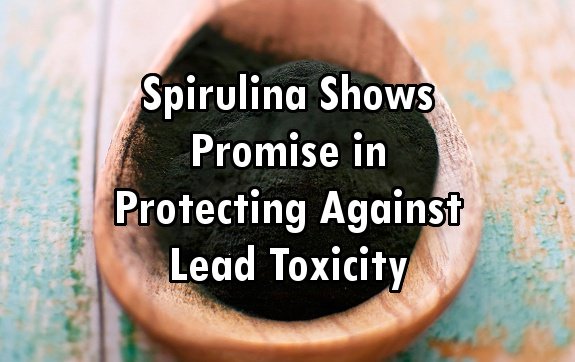Spirulina Shows Promise in Protecting Against Lead Acetate-Induced Toxicity

 Before it’s dangers were widely-known, lead was found in household paints, toys, and plumbing, among other things. Now, the toxicity of this metal is recognized, but it remains present in some cosmetics, water systems, and products brought into the U.S. from overseas. A new study indicates something as simple as spirulina supplementation could counteract the potentially damaging effects of lead.
Before it’s dangers were widely-known, lead was found in household paints, toys, and plumbing, among other things. Now, the toxicity of this metal is recognized, but it remains present in some cosmetics, water systems, and products brought into the U.S. from overseas. A new study indicates something as simple as spirulina supplementation could counteract the potentially damaging effects of lead.
The new study, “Protective effects of Spirulina maxima on hyperlipidemia and oxidative-stress induced by lead acetate in the liver and kidney”, was published in the journal Lipids in Health and Disease. The research indicated the antioxidant effects of spirulina has protective effects when dealing with lead acetate-induced damage.
“[E]xposure to lead could have generated oxidative stress which resulted in the elevation of lipids both in plasma and liver, as well as lipid peroxidation in the liver and kidney associated with the reduction in the antioxidant status. Spirulina maxima co-treatment resulted in the prevention of the lead-induced damages. … Consequently, Spirulina maximacould be useful in the preventive treatment of lead toxicity.”
Lead-acetate is known as the “sugar of lead” because of its sweet flavor. It’s most commonly found in red lipsticks and hair dyes, but can still make its way into homes through water pipes soldered with lead or in toys, ceramics, and utensils made outside of this country.
Spirulina is a natural type of algae. It’s a recognized superfood offering numerous benefits, such as radiation protection, boosted brain power, anti-cancer capabilities, and now, lead protection.
This most recent study analyzed the effects of spirulina on rats exposed to lead acetate poisoning. While the methods of the study were troubling, as the rats were intentionally poisoned and then sedated before being killed by “cervical dislocation”, the findings are worthwhile.
“[E]xposure to lead could have generated oxidative stress which resulted in the elevation of lipids both in plasma and liver, as well as lipid peroxidation in the liver and kidney associated with the reduction in the antioxidant status. Spirulina maxima co-treatment resulted in the prevention of the lead-induced damages. … Consequently, Spirulina maxima could be useful in the preventive treatment of lead toxicity.”
In other words, the rats who received spirulina alongside their lead-laced food were protected against the ill-effects of lead poisoning. Those who didn’t receive spirulina weren’t so lucky.
“It was concluded that Spirulina maxima has protective effects on lead acetate-induced damage, and that the effects are associated with the antioxidant effect of Spirulina,” concluded the researchers.
Additional Sources:

Might spirulina have the same effect on cobalt in the body? Thousands of people with hip surgeries have toxic levels of cobalt. Do you know the best way to cleanse the body of this metal?